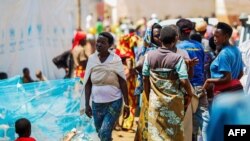Sixty-six refugees from Sudan, Somalia and Eritrea were freed from detention in Libya and flown to Rwanda on Thursday, on a flight chartered by the U.N. refugee agency.
This was the first group of refugees to benefit from a so-called Emergency Transit Mechanism agreed to early this month by Rwanda, the U.N. High Commissioner for Refugees and the African Union.
U.N. refugee agency spokesman Babar Baloch told VOA his agency expected and hoped to continue the evacuations. He noted Rwanda's refugee center has the capacity to care for 500 people.
“But it does not mean that Rwanda will only have 500,” he said. “We hope that as people come in, they are able to find solutions and move to safer locations. … And, we hope that in the coming days and weeks, we are able to fly out more refugees from Libya to safety."
Baloch said the UNHCR had registered more than 3,000 refugees in Libyan detention centers. However, he noted, more than 5,000 refugees and migrants are being held under brutal, appalling conditions in government-run facilities.
26 children
He said 26 of the 66 refugees flown to Rwanda were children, nearly all of them unaccompanied. He said one of the evacuees had not been outside a detention center for more than four years.
Baloch said the refugees were registered and were given documentation upon arrival in Kigali. They were then transferred to a transit center in Gashora, 60 kilometers south of the capital, where they were provided with accommodations, food, water and other basic relief.
"A team of nine health professionals, including a psychologist, will work alongside counselors specialized in working with children and survivors of sexual violence to provide health care and assist evacuees who survived torture, sexual violence and human rights abuses during their time in Libya," he said.
Baloch said all members of the group had been granted asylum-seeker status while their refugee claims are being assessed. This, he said, gives them the same rights as other refugees in Rwanda. They will be able to access education and health care, and work.
He added that anyone who was not considered a refugee and in need of international protection would either be helped to return home or given the possibility of gaining regular status in Rwanda.




